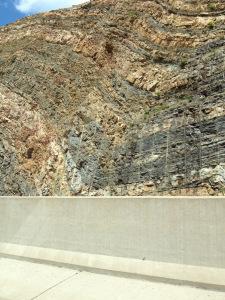The word “Anthropocene” has been showing up quite a bit lately.For a period of many years I was an avid, self-taught amateur geologist.In my dreams I still am, I guess.My interest in the ages of rocks began when I, like Charles Lyell, began to consider the implications of their extreme longevity.The Bible, of course, famously intimates we live in a comparatively new neighborhood.Having grown up believing that literally and firmly, and also having started a modest fossil collection, I failed to see the conflict.I mean, there were fossils right down there by the river.Tons of them.Some Young Earth Creationists had already begun, by that point, to suggest they’d arisen because of Noah’s flood, but dinosaurs still seemed to be a problem.In many ways rocks broke me out of my fundamentalist stupor.
While at Nashotah House I taught electives on Genesis 1-11.I read about the geologic ages of the planet and would fall into Devonian dreams of a world entirely different from ours—a world in which there was no Bible for there were no humans to make God in their image.I knew that we lived in the Quaternary Period of the Holocene Era.I don’t think the term Anthropocene was in wide use then.Parsing it is simple enough—it is the “human age.”The age in which the planet was, has been, and is being altered by human behavior. There’s no agreed-up start date for the Anthropocene, but it will likely be set in the twentieth century; the twentieth century in our way of counting.There have been millions of centuries before that.

A couple of weekends back I attended a church program on plastics.These useful polymers are deeply, deeply integrated into our lives and are promoted by the far too powerful petroleum industry.The problem with plastics is that they break down and invade the bodies of animals and humans.And although they do decompose it takes many centuries for them to do so.Naming the Anthropocene is an effort to get us to see that a human perspective is far too brief to deal with the many issues we raise.Our practices on this planet will likely not destroy the earth, but they may very well make it uninhabitable by us, or by creatures we like to see.Life is persistent, and rock lasts for eons.Even stone’s not eternal, however, and the idea of the Anthropocene is to get us to look at ourselves and realize that our use of this planet, as toxic as it is, is shortsighted.We will someday be the fossils under a bridge long crumbled to dust for those in the future who know of no such thing as Genesis. Perhaps we should act like it.
